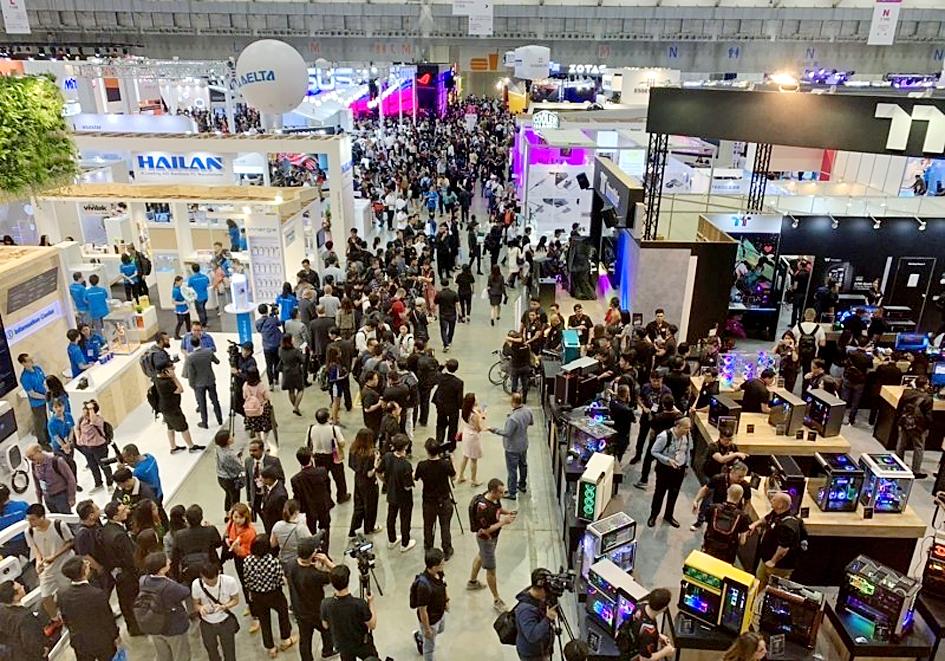Computex Taipei’s organizers have canceled the annual computer and technology trade shows due to lingering concerns over the COVID-19 pandemic and large-scale travel restrictions, the Taiwan External Trade Development Council (TAITRA, 外貿協會) said.
Originally scheduled to take place earlier this month, Computex was initially postponed to late September as the pandemic wreaked havoc across the globe.
“While Taiwan is no longer under the threat of COVID-19, the virus is still spreading in 187 other countries with more than 7.35 million cases worldwide,” TAITRA said in a statement

Photo: Lin Chin-hua, Taipei Times
Along with the heavy economic effects of the pandemic, travel restrictions and lockdown measures which are in place to prevent future transmissions of the virus might prevent overseas participants and press from traveling to Taiwan, it said.
“Preserving the health and safety of Computex’s participants remain our top priority... After careful deliberation, we have decided to cancel this year’s show,” TAITRA said.
Pointing to Taiwan’s closed borders, which greatly contributed to the nation’s success in combating the coronavirus, TAITRA chairman James Huang (黃志芳) said the potential risk of new cases from abroad remains high.
“Nobody can afford to shoulder this kind of responsibility” of new COVID-19 cases in the nation, Huang said.
Even if Taiwan has the capacity to test each and every one of Computex’s overseas visitors, the two-week quarantine is more than enough to dissuade the majority of participants, Huang said.
Nevertheless, the trade show in September would hold online exhibitions and forums, he added.
Computex, one of the largest trade shows of its kind, is cohosted by the Computer Association and attracts more than 40,000 visitors annually.
The next show is scheduled for June 1 to June 5 next year.

SELL-OFF: Investors expect tariff-driven volatility as the local boarse reopens today, while analysts say government support and solid fundamentals would steady sentiment Local investors are bracing for a sharp market downturn today as the nation’s financial markets resume trading following a two-day closure for national holidays before the weekend, with sentiment rattled by US President Donald Trump’s sweeping tariff announcement. Trump’s unveiling of new “reciprocal tariffs” on Wednesday triggered a sell-off in global markets, with the FTSE Taiwan Index Futures — a benchmark for Taiwanese equities traded in Singapore — tumbling 9.2 percent over the past two sessions. Meanwhile, the American depositary receipts (ADRs) of Taiwan Semiconductor Manufacturing Co (TSMC, 台積電), the most heavily weighted stock on the TAIEX, plunged 13.8 percent in

A wave of stop-loss selling and panic selling hit Taiwan's stock market at its opening today, with the weighted index plunging 2,086 points — a drop of more than 9.7 percent — marking the largest intraday point and percentage loss on record. The index bottomed out at 19,212.02, while futures were locked limit-down, with more than 1,000 stocks hitting their daily drop limit. Three heavyweight stocks — Taiwan Semiconductor Manufacturing Co (TSMC, 台積電), Hon Hai Precision Industry Co (Foxconn, 鴻海精密) and MediaTek (聯發科) — hit their limit-down prices as soon as the market opened, falling to NT$848 (US$25.54), NT$138.5 and NT$1,295 respectively. TSMC's

ASML Holding NV, the sole producer of the most advanced machines used in semiconductor manufacturing, said geopolitical tensions are harming innovation a day after US President Donald Trump levied massive tariffs that promise to disrupt trade flows across the entire world. “Our industry has been built basically on the ability of people to work together, to innovate together,” ASML chief executive officer Christophe Fouquet said in a recorded message at a Thursday industry event in the Netherlands. Export controls and increasing geopolitical tensions challenge that collaboration, he said, without specifically addressing the new US tariffs. Tech executives in the EU, which is

In a small town in Paraguay, a showdown is brewing between traditional producers of yerba mate, a bitter herbal tea popular across South America, and miners of a shinier treasure: gold. A rush for the precious metal is pitting mate growers and indigenous groups against the expanding operations of small-scale miners who, until recently, were their neighbors, not nemeses. “They [the miners] have destroyed everything... The canals, springs, swamps,” said Vidal Britez, president of the Yerba Mate Producers’ Association of the town of Paso Yobai, about 210km east of capital Asuncion. “You can see the pollution from the dead fish.